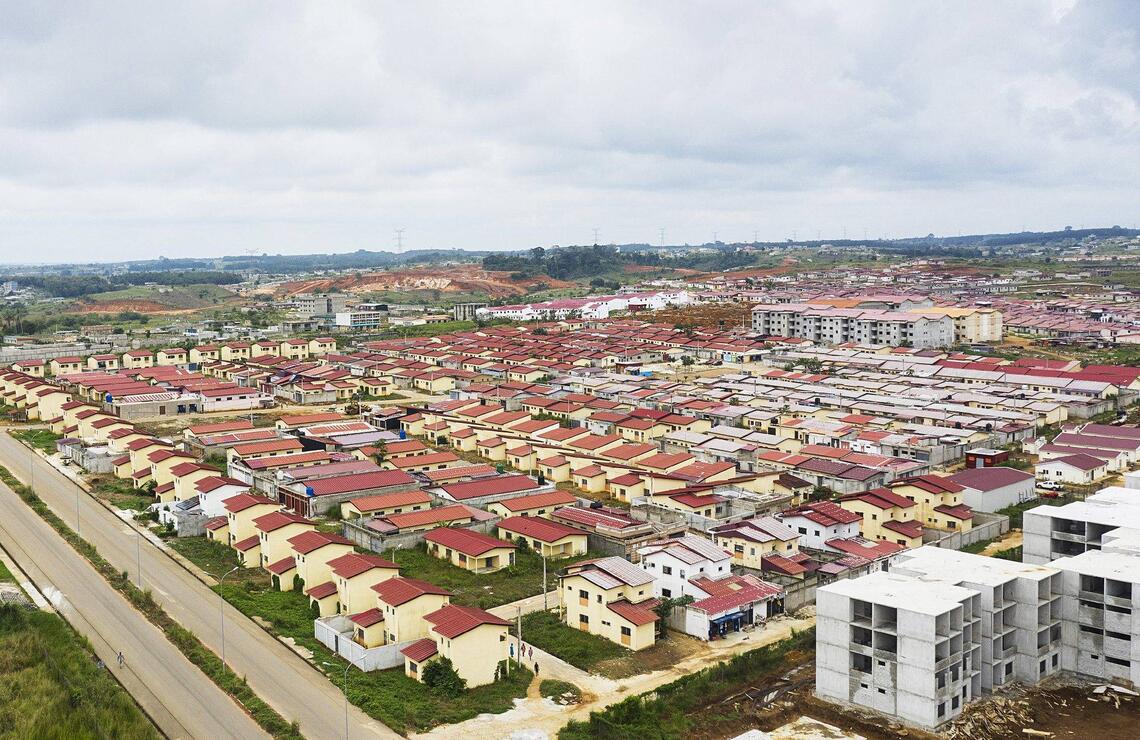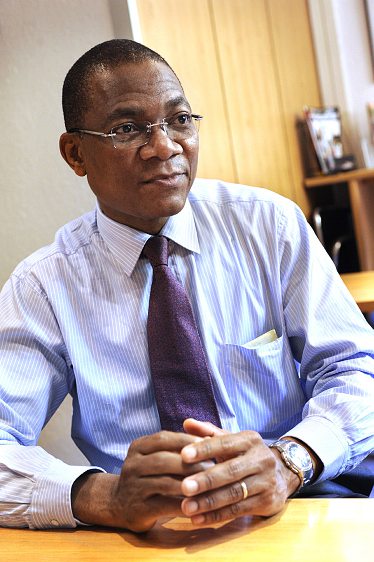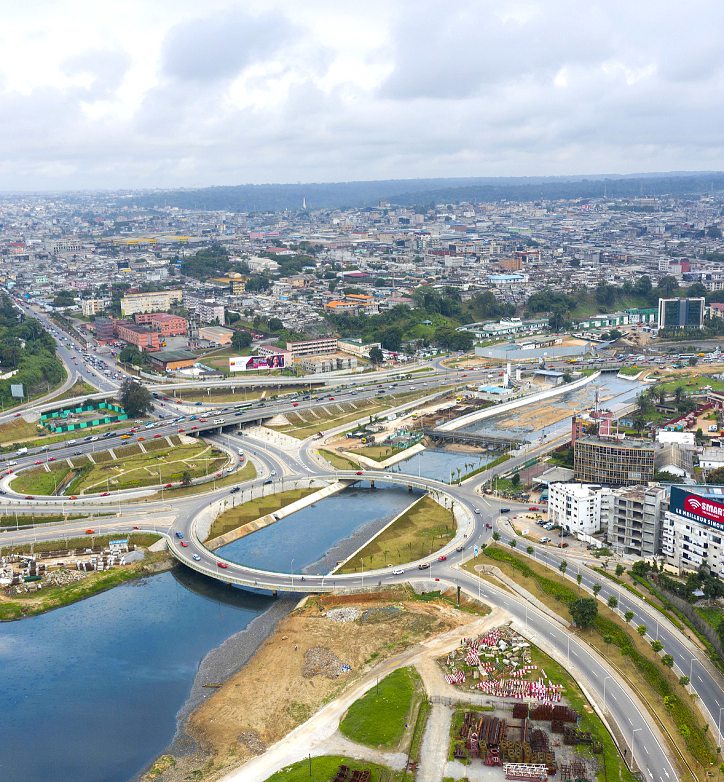
Housing, construction and
urban planning:
The master plan
A chronic housing crisis triggered by the shortfall of 800,000 homes has led to a frenzy of building projects in Côte d'Ivoire, often to the detriment of town planning and safety regulations. The minister in charge, Bruno Nabagné Koné, has launched an emphatic policy to clean up practices and speed up procedures.
The big problem for land buyers was obtaining the ‘arrêté de concession définitive’ (ACD), is an official document issued by the building authorities in Côte d'Ivoire and the one and only document that confers ownership of land acquired in an urban area. It’s an opaque process that can take years, often forcing citizens to find ‘privileged contacts’ within the Ministry of Construction, Housing and Town Planning in order to move their case forward.
The move towards the Ministry’s digitisation and the computerisation of its processes launched by Bruno Nabagné Koné, appointed Minister of Construction, Housing and Town Planning in July 2018, has changed the situation and considerably streamlined administrative procedures. Now, it takes just a few months to obtain an ACD if everything is in order. What's more - and this is a real relief for Bruno Koné - he recently had the electronic signature system introduced. In 2020, he signed 17,000 ACDs by hand. “In Côte d'Ivoire, it's the minister himself who signs all the ACDs. I used to spend whole evenings signing them”, he admits. From now on, he will be affixing an electronic signature at the bottom of each ACD, speeding up the process considerably. What's more, it provides greater legal protection for owners, reassures economic operators and restores the document's value as an ‘economic lever’.
The other major challenge was compliance with building regulations. When several buildings dramatically collapsed, the problem of ‘unauthorised building’ came to the fore. New laws make it compulsory to have a building permit (now available in twenty-one days), the services of an architect for any construction in an urban environment, and the services of a consulting engineer for the construction of any building over two storeys high. The aim is to prevent unlawful building practices, such as building without planning permission, and to ensure that the work is carried out in a safe and professional manner. Compulsory insurance for building sites is currently being considered. In fact, the number of inspections has increased: 9,800 in 2021, 14,000 in 2022, and almost 19,000 in 2023. An internal ministerial intervention brigade, set up for this purpose, can go so far as to ask the minister for permission to demolish a built structure. Only two demolitions were ordered in 2020, 51 in 2021 and 165 in 2022. In 2023, the number of demolitions dropped for the first time, indicating a degree of normalisation. The number of collapsed buildings fell drastically ( 11 in 2020, three in 2022, and two in 2023).
RETHINKING CITIES IN A SUSTAINABLE WAY

Making life easier for users by simplifying rules and speeding up procedures, improving the legal soundness of administrative acts and ensuring personal safety were Bruno Koné's priorities when he took the reins of this ministry. The aim was to improve a sector that was badly in need of a clean-up, and to enable private construction firms, especially property developers, to work in favourable conditions. After all, the goal of putting a decent roof over the head of every Ivorian remains out of reach. It will take years to reduce the cumulative housing shortage of 600,000 to 800,000 homes, particularly in the metropolis of Abidjan, which is expected to have 10 million inhabitants by 2040, and in a country with an urbanisation rate of 52%. It is the city itself that needs rethinking to make it ‘inclusive, healthy, resilient and sustainable’. In fact, the master plans for 31 main towns, including Yamoussoukro, the country's political capital, are currently being revised, and the minister intends to ensure that they are strictly applied to pull the building industry out of anarchy. “We need to rethink the issues of housing, quality of life, energy, waste treatment and mobility”, says Bruno Koné.

HOUSING FOR ALL
Lastly, the Ministry of Construction contributes to the social dimension of President Alassane Ouattara's policy. The government has launched a programme to build 150,000 new social housing units (the Presidential Social Housing Programme) by 2025, with the aim of providing affordable housing for the middle class. However, this programme has proved difficult to implement. The challenge was finding a financing system in which private operators, banks and the State could work together. Since then, the Banque de l'Habitat de Côte d'Ivoire has been recapitalised, the government has made ‘secure land’ available to developers and granted them tax breaks and is working on setting up a social housing guarantee fund. All this has helped to reduce the final cost of homes built under the programme by 30 to 40%. Minister Bruno Koné said: “The social housing programme has experienced major delays, but today it is back on track. It is more relevant than ever.” In March 2023, the government announced the construction of 30,000 homes on several sites and 75,000 new homes on the outskirts of Abidjan, to be built by 25 property developers.
The process of turning the construction sector around, so that it can play its full part in the country's economic and social development, is well under way... at breakneck speed.
|
An Urban Investigation and Enforcement Brigade On the perimeter wall of this unfinished building in the new Djorobité district of Cocody, which recently sprang up in the north of Abidjan, a sign in bright red reads ‘PC? Clearly, the owner of this building under construction is unable to produce a building permit (Permit de Construire - PC) for the Ministry of Construction, Housing and Urban Planning's Urban Investigation and Enforcement Brigade. “The procedure for requesting the destruction of a building is initiated with the Ministry's cabinet”, explains the officer in this increasingly powerful department. Only the minister can order the destruction of a structure. Set up in 1992, the brigade has never given Ivorians much cause for concern. However, it also lacked technical and human resources. People “had got into the habit of building without permits”, says the head of the brigade, Yao N'Goran. “But in 2020, eleven buildings collapsed, with one of them killing twelve people.” It was a real wake-up call. Since then, the political will has been firm. The aim is to get Ivorians to comply with the applicable regulations, in particular those relating to building permits, in order to ensure people's safety. “Since 2022, we have received rolling stock, motorbikes to carry out checks in the field, 4x4 vehicles, and the number of staff has risen from 39 to 200.” In fact, the number of structures destroyed has increased: two in 2020, 51 in 2021, 165 in 2022 and 103 in 2023. “The drop in numbers in 2023 is due to the fact that we destroyed a lot of dangerous buildings the previous year. But the work is far from over: the brigade has identified 122,000 buildings in the Abidjan district, and all of them will have to be inspected. Abidjan is divided into 23 construction zones, each with its own station manager. These are then subdivided into four sub-zones. In this way, the brigade, which is sometimes contacted by citizens, systematically scours the terrain. “It's a huge task,” adds Yao N'Goran. “Our aim is to achieve zero collapses and to get our fellow citizens to obtain planning permission before starting work. All the laws are there, we just have to respect them. That's our big challenge!” |